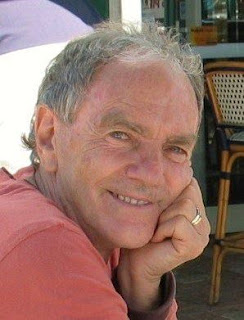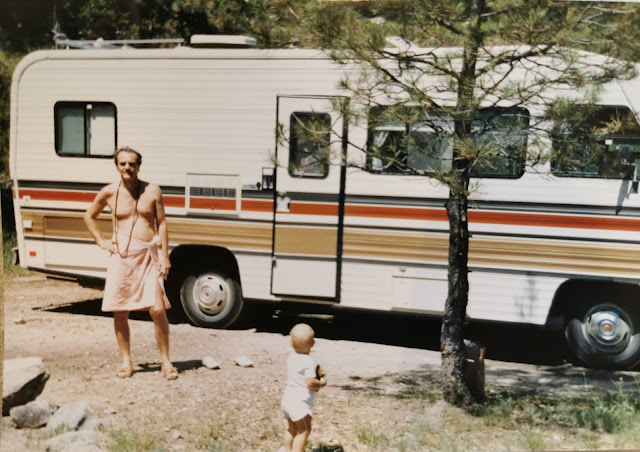Chernobyl
Having somewhat more of the "retired" time, I caught up with some shows I liked to watch. These were, for instance, the last three episodes of the Game of Thrones - luckily no one, from among my friends or family, told me how the season ended. Also, with Lady Wife, over the last two days we watched five episodes of the HBO series "Chernobyl." It was highly recommended by my cousin, Grzegorz.
Though referring to the rather gruesome episode in the history of the humankind, which cost, reportedly, thousands of lives, the series was very interesting to watch. Partially, perhaps, because it was about something we could relate to personally. We still remember waiting in lines to give our children iodine pills - my older son, Maciek, was not yet three years old at that time, while younger, Pawel, was a three months old baby. We still remember challenges of explaining to children (ours and my sister's) why they cannot play outside. The series is also a great illustration of the last years of communism, the reality of which caused many of us to emigrate.
One could argue that Chernobyl had to happen because of the nature of the system - tendency to cut corners, stress on meeting production quotas no matter what, general alienation of the society, caused by the difficulty, at times impossibility, of telling the truth. The series seems to suggest that the accident was caused by human error - the kind of Soviet version of the "culture of irresponsibility," to borrow from Obama. But it was also caused by the basic flaws of the design of Soviet nuclear reactors. Some people believe that Chernobyl was one of the last nails in the coffin of communism, unveiling enormous inefficiency of the system. The film also shows tremendous heroism of many people, who often at the cost of one's own life, worked tirelessly to limit the consequences of the catastrophe.
Nuclear energy seems to be inherently dangerous. This was also confirmed by Fukushima disaster not so long ago, which also contaminated soil and air, and brought radioactive debris as far as the West Coast of Canada. There were also other near misses, including in the United States. However, the question is, if not through nuclear energy, which is dangerous, and not by burning coal, which seems to dangerously warm the planet, how else to satisfy the need for energy of ever increasing population?
"Greens" all over the world argue that the only solution is in "renewable energy" of the sun and wind. These technologies seem to become more available and more affordable. I am glad that, with the help of the Province of Alberta and the city of Edmonton, I was able to do my "small part."
The solar panels I installed last October have already reduced my electricity bill to zero, and, in theory, should produce more electricity than our household uses over a year. This still needs to be verified. True, I could use the money I spent on this system to buy a newer car, or go for a couple of cruises with my wife. With the current prices of electricity, it will also take about 10 years for this investment to pay off. However, I am glad that we did this investment when we still had means (before retirement). I also hope that this effort, if emulated by more Albertans, will eliminate a need for nuclear reactor in our province, and thus reduce the risk that my children, and possibly their children, will ever experience a tragedy similar to Chernobyl.
(PR)
Though referring to the rather gruesome episode in the history of the humankind, which cost, reportedly, thousands of lives, the series was very interesting to watch. Partially, perhaps, because it was about something we could relate to personally. We still remember waiting in lines to give our children iodine pills - my older son, Maciek, was not yet three years old at that time, while younger, Pawel, was a three months old baby. We still remember challenges of explaining to children (ours and my sister's) why they cannot play outside. The series is also a great illustration of the last years of communism, the reality of which caused many of us to emigrate.
One could argue that Chernobyl had to happen because of the nature of the system - tendency to cut corners, stress on meeting production quotas no matter what, general alienation of the society, caused by the difficulty, at times impossibility, of telling the truth. The series seems to suggest that the accident was caused by human error - the kind of Soviet version of the "culture of irresponsibility," to borrow from Obama. But it was also caused by the basic flaws of the design of Soviet nuclear reactors. Some people believe that Chernobyl was one of the last nails in the coffin of communism, unveiling enormous inefficiency of the system. The film also shows tremendous heroism of many people, who often at the cost of one's own life, worked tirelessly to limit the consequences of the catastrophe.
Nuclear energy seems to be inherently dangerous. This was also confirmed by Fukushima disaster not so long ago, which also contaminated soil and air, and brought radioactive debris as far as the West Coast of Canada. There were also other near misses, including in the United States. However, the question is, if not through nuclear energy, which is dangerous, and not by burning coal, which seems to dangerously warm the planet, how else to satisfy the need for energy of ever increasing population?
"Greens" all over the world argue that the only solution is in "renewable energy" of the sun and wind. These technologies seem to become more available and more affordable. I am glad that, with the help of the Province of Alberta and the city of Edmonton, I was able to do my "small part."
The solar panels I installed last October have already reduced my electricity bill to zero, and, in theory, should produce more electricity than our household uses over a year. This still needs to be verified. True, I could use the money I spent on this system to buy a newer car, or go for a couple of cruises with my wife. With the current prices of electricity, it will also take about 10 years for this investment to pay off. However, I am glad that we did this investment when we still had means (before retirement). I also hope that this effort, if emulated by more Albertans, will eliminate a need for nuclear reactor in our province, and thus reduce the risk that my children, and possibly their children, will ever experience a tragedy similar to Chernobyl.
(PR)



Comments
Post a Comment